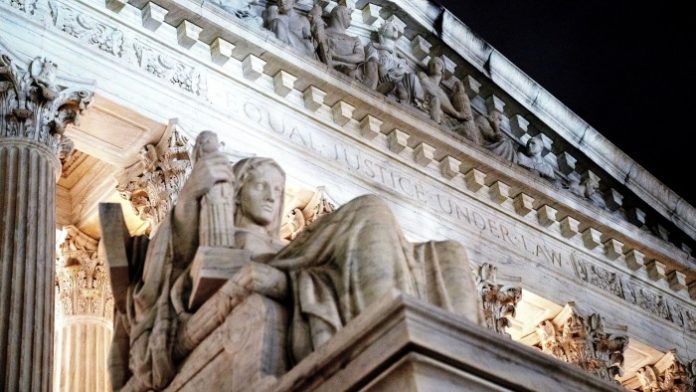Unlock the White House Watch newsletter for free
Your guide to what the 2024 US election means for Washington and the world
The Rockies may crumble and Gibraltar may tumble. But if Donald Trump obeys the courts, the US republic will stand. America’s system is designed to accommodate almost anything except a return to de facto monarchy. Whether America’s president wants to render the judiciary irrelevant is key to the republic’s fate. Is Trump about to conduct that little experiment?
To some extent he already is. Last month, a US court stopped Trump’s blanket freeze on federal spending. Trump has only partially complied. On his first day he all but tore up a Supreme Court ruling from the previous week upholding Congress’s ban on TikTok. Both his vice-president JD Vance and his chief operating officer Elon Musk have publicly questioned the writ of the courts. Musk even called for impeachment of the judge who denied his minions access to the federal payments system.
Such threats might be overlooked were it not for their inevitability. They are bound to get louder. Though Trump has been in office for more than three weeks, he has yet to send a substantive bill to Congress. Some observers have compared Trump’s flurry of action to Franklin Roosevelt’s first 100 days, or Lyndon Johnson’s Great Society agenda. They are missing the point. FDR and LBJ sent big legislation to Congress. Trump is starting with a pipeline of executive orders. If the courts stymie those, they will be blocking his agenda. His strategy rests on a pliant judiciary.
There are two ways of Trump executing what legal scholars Bob Bauer and Jack Goldsmith call his “radical constitutionalism”. The first is to frighten the courts into acquiescence. If judges believe Trump is prepared to call the judiciary’s bluff, it would be in their interests to pretend that he is only acting because they have allowed him to. Rather than Trump obeying the courts, they would be politely getting out of his way. In that manner they would at least keep the fiction of being an independent branch of government. The other option is for Trump to dare the courts to enforce their adversarial rulings. Both Vance and Musk are pushing to call time on the judges. So is Russell Vought, Trump’s incoming head of the office of Management and Budget and chief author of the infamous Project 2025.
It is a fair bet that Trump would prefer the judiciary to disarm. But he is also prepared to play Russian roulette. He believes the US electorate gave him an unchecked mandate. It follows that any interference in his exercise of power — including an Alice-style belief that the US constitution means what he chooses it to mean — amounts to a block on democracy. Could he put 30,000 illegal immigrants beyond legal reach in a refitted Guantánamo Bay? Of course. The American people have spoken. Might he pick which of America’s creditors to repay and which to declare fraudulent? Quite possibly. Trump, not judges, will be the decider.
Until recently, Trumpians were keen to remind critics that the US was founded as a republic not as a democracy. That line has shifted 180 degrees. The new one is that the republic’s antique furniture is getting in the way of Trump’s democratic mandate. The Republican-controlled Congress has removed itself from Trump’s path. Unelected judges are the problem. Ultimate among those are the nine justices of the US Supreme Court. It is to their inboxes such dilemmas are heading. At stake is their reason for existing.
Turkeys are allegedly opposed to Thanksgiving. Yet the Supreme Court last July granted the US president sweeping immunity from almost any “official” acts. It takes little imagination to infer that this could be stretched to ignoring the courts. The six justices who put their names to that ruling may now regret their loose phrasing. They could have edited themselves into an advisory body. The problem the court faces is that Trump has a strong wind at his back. Constitutional lawyers warn that he could destroy America’s separation of powers. But Trump’s 53 per cent CBS-YouGov approval rating last week is his highest ever.
In addition to their abysmal poll ratings, Democrats are slow to get their act together. For reasons best known to him, Joe Biden last year boasted of having continued to forgive student debt even after the Supreme Court ruled against it. Both Biden and Barack Obama resorted to executive orders to get around gridlock. The difference is that Trump could push most of what he wants through Congress. That he is not yet bothering to try is a feature of his rule, not a bug.




